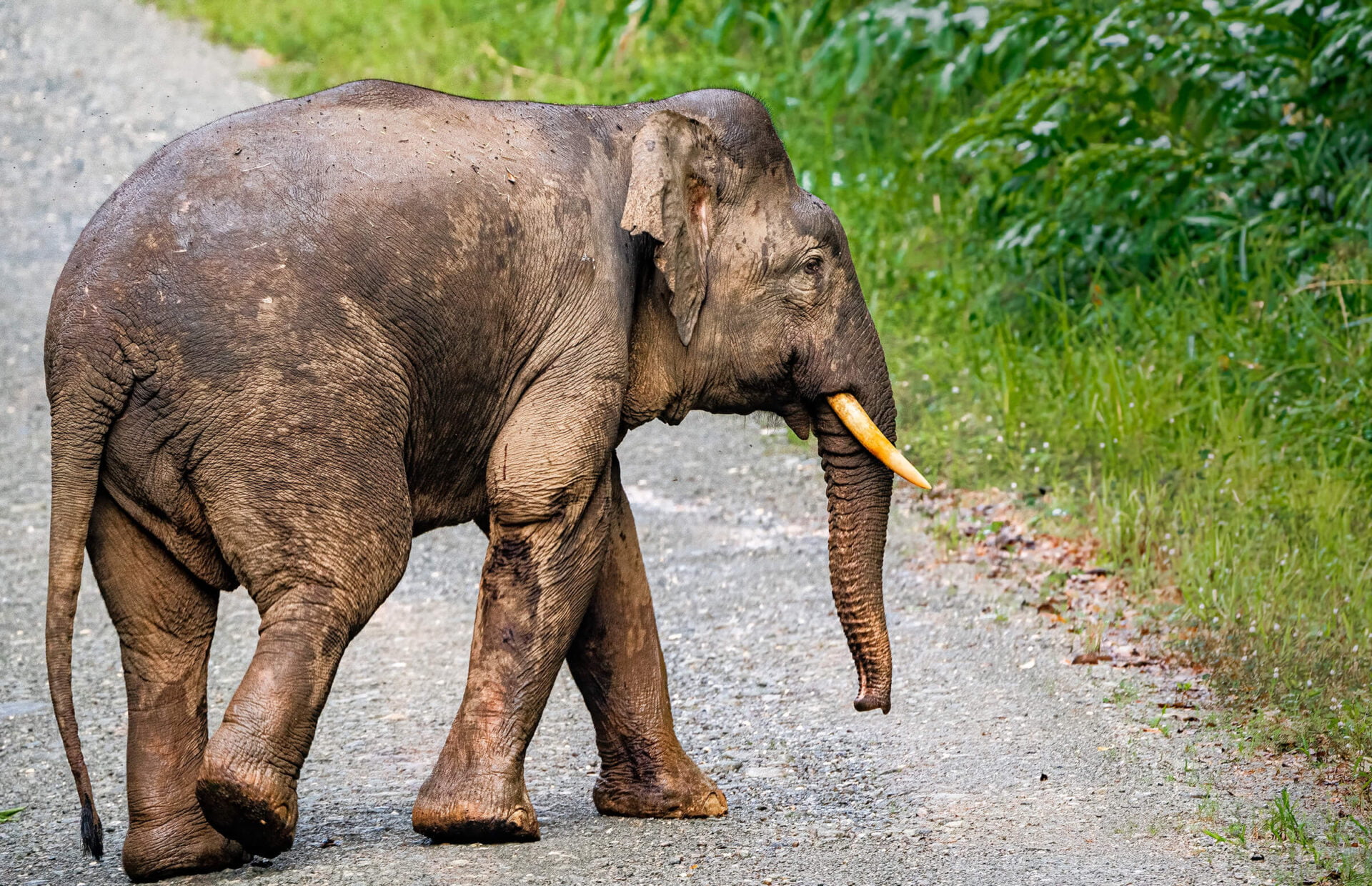
Deramakot Travel | The Forest Reserve in Borneo with Best Mammal sightings
Travel to Deramakot forest reserve, a carefully hidden gem rich in rare wildlife with 75% of Sabah’s mammal species found in this 55,507 hectares of mixed dipterocarp forest. With only a few chalets maintained by the forest department, and no luxury resorts or other entertainment for miles around, this is the place for the finest wildlife enthusiasts. One Must make Prior Arrangements to get all the Entry Permits and room bookings done, unlike many other Borneo destinations. This is where Safari Acacia can assist you to travel Deramakot Forest Reserve and experience its all natural secrets, completely hassle free. Once you contact us, our team can check with Forest Department and block your rooms, arrange the 4wd Safari Vehicles with expert drivers who are working in Deramakot for decades and are well aware of the Deramakot forest and the animal movements here, and manage all the entry permits for you.
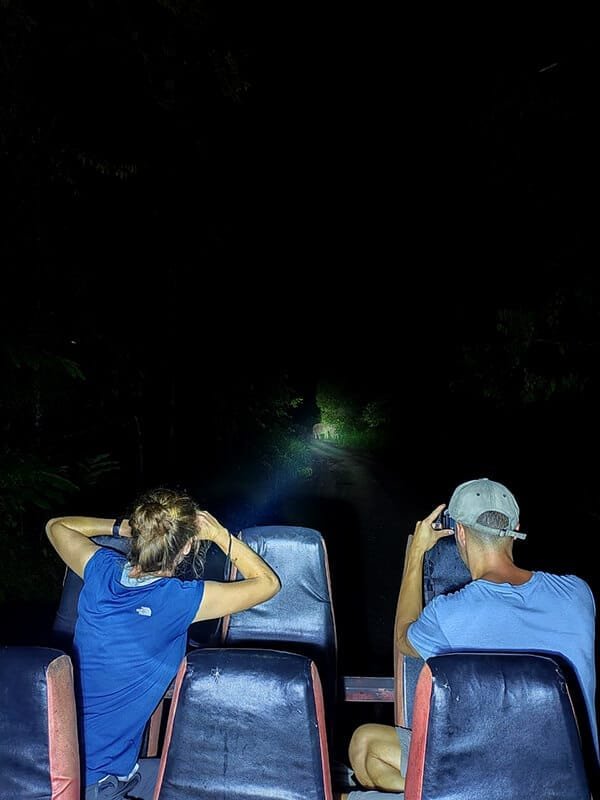
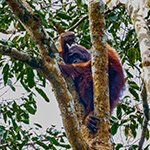
5D4N Private Deramakot Forest Package
This completely private guided safari of Deramakot for minimum 2 pax sharing gives you the exclusive opportunity to see and photograph basically all Wild Cat species of Borneo in one single trip. This is our most popular itinerary to understand and observe the Rainforests of Borneo and its elusive, and secretive nocturnal wildlife. Most part of the trips will be in terms of night and dawn/dusk 4WD safari.
We recommend a minimum of 2 nights Tour in Deramakot. Longer tours for 7-10 nights are offered.
We meet you at Sandakan airport or any hotel nearby Sandakan airport at 10am in the morning, and drive you to Telupid town by tourist van or small car according to the no. of pax. Driving distance of ~120 kms and takes ~2.5 hours on paved roads.
You will have lunch at this small town (from a veg/non-veg/vegan choice of basic fried rice, fried noodles, rice with local curry and some canned drinks) before we embark on our adventurous journey to the Deramakot forest reserve by a well-equipped 4wd vehicle. The last leg of the journey will be through unpaved challenging roads frequented by wild elephants. Nocturnal animals will not be active yet, however primates, birds and monitor lizards are not uncommon. We will reach the camp around 5 pm. There is a restroom at the main entry point of Deramakot forest reserve.
Upon arrival at the camp, you will be transferred into your respective rooms to freshen up, followed by a sumptuous dinner. After that we will start our first night safari of 2 hours. This will be more towards an understanding of the forest and the terrain, our naturalist will brief you accordingly.
Our naturalist will discuss with you and decide on the time of the morning safari. You will wake up to the sound of Bornean gibbons, mostly the males and followed by the females. Usually the primates are active once the first Sunlight falls on the trees, that is, around 7 am. Depending on the weather condition and last night’s animal activity, you might also start a bit early when it will be still dark and the wild cats might still be seen. You will be back to the camp for breakfast. Take a nap afterwards, or stay at the balcony of the dining hall to photograph leafbirds, broadbills, serpent eagles, hornbills and many other birds. After lunch you can take a rest for a while before we start our afternoon safari to see mainly primates and birds. We will come back for dinner and then will go for the night safari. On average, we will spend on an average 7 hours each day on safari.
We can follow a similar schedule as the previous day. Alternatively, we can skip the morning safari and after lunch we can proceed with packed dinner, driving all the way to the riverside and only after sunset we will start our night safari from that spot. A romantic sundowner can be arranged, weather permitting. Boat rides upriver can also be arranged with additional charges occasionally.
A repeat of Day 2. Or can be adjusted according to your preference after discussing with your private guide on previous night.
The last day is free and easy. After breakfast we will leave Deramakot for Sandakan via Telupid town. We will drive slowly and will stop for interesting photo opportunity on the way.
Package includes:
- Private Transfers Telupid, and other transfers can be arranged at additional prices.
- All National Park Permits and Entry Fees, naturalist fees and Guide charges, Still Camera charges etc.
- Three full meals daily.
- Mineral Water during your stay.
- All applicable taxes.
Package excludes:
- Personal spending money for drinks of any kind.
- Any food item not mentioned.
- Laundry, phone calls or any personal charges.
- Tips and gratuities.
- wifi cost at the forest chalet.
Private Deramakot
4N5D Deramakot safari package-
All-inclusive Safari package
-
Senior specialist guide
-
7 hours Daily Game Drives
Best time to visit Deramakot
July to September is the peak tourist season in Deramakot Forest Reserve, however, the wildlife viewing opportunity is quite similar the whole year with occasional rains (it is a rainforest after all) throughout the year disrupting the safari activities, but very unlikely the whole days it pours and forces you to stay in your room. Fruiting trees will enhance the wildlife experience, and there is no fixed fruiting seasons.
The forest is open throughout the year. If it is too dry in Deramakot, the animal movement might seizes. And then with a shower, they become immensely active.
It is suggested to avoid July-August as it is a peak season and Deramakot is too crowded, and one will miss the essence of Deramakot for which it is famous, intimate and serious wildlife experience.
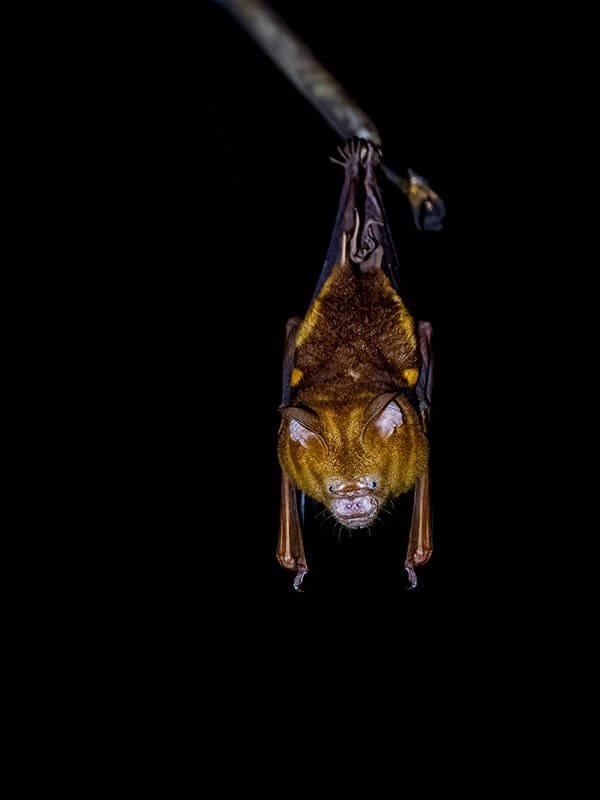
Wildlife Encounter to Cherish in Deramakot
We have experience to run several wildlife expeditions in this remote rainforest of Borneo to track elusive animals. Primates like Orangutans, Sabah grey langur, Silver leaf monkey, Maroon leaf monkey in the daytime and elusive wild cats like sunda clouded leopard, sunda marbled cat, sunda leopard cat, unique nocturnal civets like banded civets, otter civets, slow loris, flying lemur in the night game drives are some of the magnificent animals one can find here. Pygmy elephants are encountered quite often. All five species of Bornean wild cats – Sunda Clouded Leopard, Bornean Bay Cat, Marbled Cat, Flat Headed Cat and Leopard Cat were recorded in Deramakot. And Deramakot Forest Reserve is a birder’s paradise.
How to Safari in Deramakot
Borneo Wildlife Safari in Deramakot Forest Reserve is unique as this is the place where you can do 7 hours daily game drives. And the timings of the Safari is completely flexible depending on weather and animal movement and your target wildlife species. For example, early morning and late afternoon drives are prioritized for guests who want to see primates, and more night time drives are arranged for those who are more interested on wild cats or civets or other nocturnal species. And then daytime can be spent around the dining hall for birding or to read the books on Borneo. Sometime special interest late night safari and early dawn game drives are also arranged.
Wildlife Photographer specific special Deramakot tours are arranged often, when additional drives are arranged. Deramakot is placed on the highest regard in the mammal watching scene of the whole world.
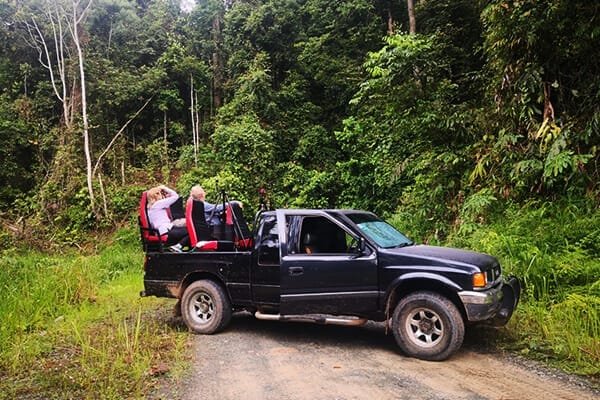
Location, Accommodation and Food in Deramakot
There is only one option to stay in Deramakot Forest Reserve, and considering its remoteness, the accommodation option and food here is fantastic. The Deramakot Park HQ has Air Conditioned chalet rooms in Deramakot with en-suite bathrooms, hot shower and western style toilets. Blankets, towels and pillows are provided. Rooms are really limited in Deramakot and are fully booked months even years in advance. The rooms in Deramakot Forest Reserve is only accessible by four-wheel drive (4wd) from the nearest town of Telupid. The nearest airport is Sandakan airport, however, transportation from Kota Kinabalu airport can also be arranged easily. One can either use our transport from Sandakan, Kota Kinabalu, Sukau or Lahad Datu or any other area for peace of mind; or can also use public bus service. Our team will be happy to guide you on buying bus tickets.
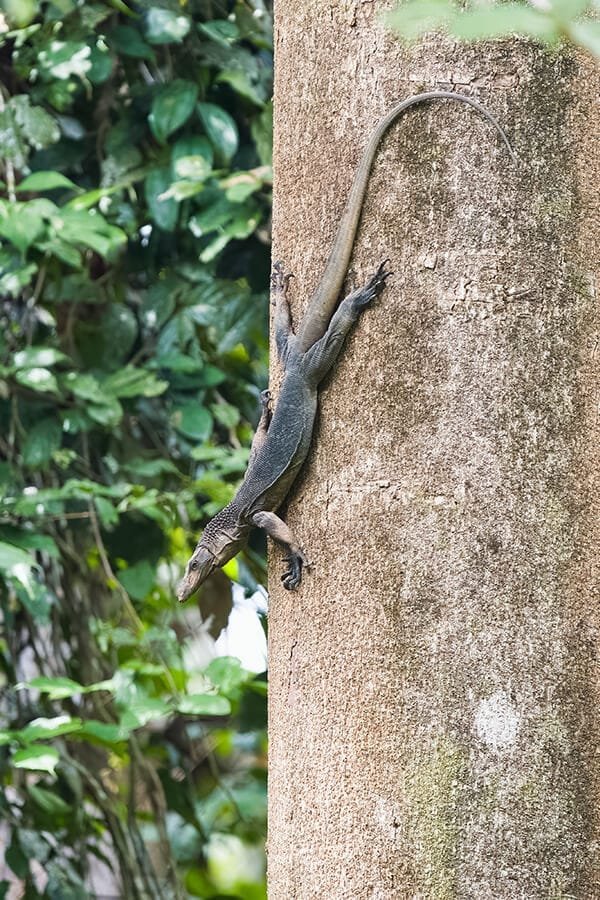
Our Guides and Gears in Deramakot- the Industry Best
The most important part of any wildlife expeditions, we appoint the handpicked best Licensed guides particularly who are experienced in Deramakot Forest. Not many licensed guides are available at present who has experience in this forest and tracking its nocturnal animals, and Safari Acacia is proud to claim that our guides are the topnotch and internationally acclaimed. The night spot lighting from a 4wd vehicle is an amazing art and we have the bests in our team. Armed with the state of the art spot lighting system used in the wildlife travel industry, like the powerful Acebeam k75 2.0 which can technically throw 6300 lumens of light at a distance of 2500 meters on regular nights, our guests can observe the animals high up on the tree. Ofcourse such a powerful professional device is only handled by our trained guides with utmost care. It is particularly very useful for the wildlife photographers. We also use tripod mounted modern scopes to clearly observe distant animals. You sometime will miss such professional gears with other tour operators.
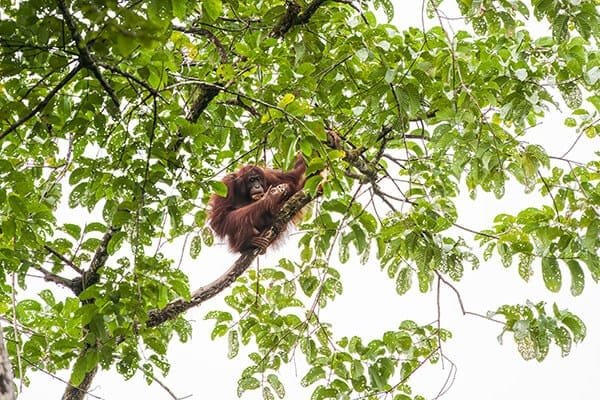
The wild Orang Utan of Deramakot Forest
When you book your Deramakot Forest Reserve expedition, we will take you to a remote forest where you can find actual Wild Orang Utan, not relocated from rehab centers, also there is no feeding station here. So when you find one, it will be in its natural habitat displaying its Natural Behavior.
Keep in mind that these animals are not accustomed to being startled by the sudden presence of humans, unlike the animals that you would see in the rehabilitation centers. It would be helpful if you could maintain a low profile, refrain from making any unexpected movements or noise, and give the “Human of Forest” some time to adjust to your presence.
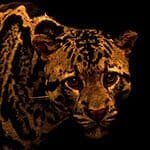
Wild cats of Deramakot forest reserve
All five species of Bornean wild cats, namely, leopard cat, marbled cat, clouded leopard, flat-headed cat, baycat are seen, leopard cat being the most common and baycat the rarest. Infact, this is the only forest where all five wild cat species are recorded.
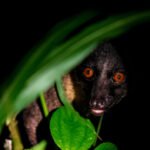
Civets of Deramakot forest reserve
7 Species of civets are recorded from this forest. Commonly seen by our guests: island palm civet, striped palm civet, 3 striped palm civet, otter civet, banded civet, malay civet. All of them are nocturnal. Except the malay civet which is terrestrial, the other civet species are highly arboreal.

Primates of Deramakot forest reserve
Among primates, of course the main attraction is the completely Wild population of Orang Utan inhabiting this forest. Maroon langurs, silver leaf monkeys are commonly seen during the day-time safari, and flying lemur, Philippines slow loris are commonly seen in night safaris. Recently described Sabah gray langurs are also recorded a few times very close to the basecamp.
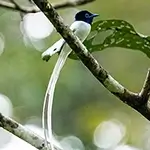
Birds of Deramakot forest reserve
289 species of birds are recorded from Deramakot. Broadbills, treeswifts, pittas, woodpeckers, leafbirds, spiderhunters, owls, eagles, bristleheads, flycatchers, frogmouths, nightjars of several species has been seen by our guests. Seven species of hornbills can be seen flying over the canopy here, White-crowned, Rhinoceros, Oriental Pied, Wreathed and Wrinkled are among them.
Useful Information about Deramakot Forest Travel
-
- When you travel to Deramakot Forest Reserve, please inform us of your dietary requirements. We will also be excited to discuss If you like to try any particular local dish. Please bear in mind that we will be staying in a remote rainforest miles away from the nearest supply. We will do our best to provide both Western and Asian style varied meals, freshly cooked by the experienced chef stationed in the camp.
-
- We will provide you field guide books during safari. You can also read through an extensive collection of books on Borneo while in the camp.
-
- We can arrange wifi for an additional cost (MYR 20 per 1 GB data) to your room.
-
- You need a pair of slippers and comfortable walking/trekking shoes, rather than heavy duty gumboots/Wellington boots. Slippers are useful to walk from your room to the canteen (~100 meters) and the safaris are by car. Due to the presence of wild pygmy elephants in the vicinity, the forest rangers do not encourage walking safaris. We also believe in safety first for our clients.
-
- You need a raincoat/poncho as short heavy rains are quite common in this part of the world. We can also arrange it for you, if requested in advance.
-
- Please also bring rain covers or waterproof bags to secure cameras/binoculars during rain. Or you can request us in advance mentioning the model of your gears.
-
- A headlamp is always handy, so is mosquito repellent and antiseptic cream in tropical forests.
-
- We will provide one water bottle per pax when we meet and greet, you can refill it from the dining hall anytime. Tea/coffee/milo with hot water and Breads with jam/spread are complimentary, and available 24 hours at the same spot. Limited choices of soft canned drinks and alcoholic beverages can be pre-arranged at an additional charge.
-
- Blanket, towel, pillow, clean bed sheets will be provided and replaced. Kindly carry the other personal amenities, or request us in advance.
-
- In each chalet you will get limited charging points, so you might consider carrying a multiplug to charge multiple gadgets together at the same time.
-
- Due to weather conditions, activities may be subject to re-scheduling to best meet operations, as well as client’s health and safety.
Frequently Asked Questions about Deramakot Travel
Deramakot Tour - Book Early
There is only one accommodation option in the entire Deramakot Forest reserve which is completely full booked most time of the year and several months, even years in advance. So plan and book at your earliest. Other than accommodation, you also need to book with us quite in advance so that we can block our Deramakot Specialist Senior Guides for your trip.
Can I go to Deramakot in rainy season?
Borneo’s rainforest is known for sudden downpours. Always carry waterproof gear, including a jacket, shoes, and a backpack cover. And such slight rain adds to the fun of rainforest expeditions. The endemic animals also do not like it to be too dry, so you need a bit of rain so that the animals are more active.
What should I bring when visiting Deramakot?
It’s advisable to bring lightweight, long-sleeved clothing for protection against insects, poncho or rain jackets and rain protection for your camera gears, sturdy footwear for walking on trails, binoculars for wildlife viewing, and a good camera for photography. Don’t forget insect repellent, sunscreen, and a flashlight for night safaris.
Is Good guide important in Deramakot?
Your senior guide is your key to the forest, so listen carefully to their instructions. They are treasure troves of information regarding Deramakot, its mammals and overall wildlife of Borneo. They will ensure you have the best chance to observe wildlife and navigate the forest safely. Our Guides in Deramakot are handpicked, and they are equipped with experience and a deep understanding of the forest’s nocturnal rhythms along with topnotch spotlight, scopes and other guiding tools to make your wildlife expedition the best.
Can I visit Deramakot independently or do I need a guide?kot forest reserve affected by logging?
Walk-in safari are not permitted in Deramakot Forest Reserve, You must arrange entry permit, vehicle permits in advance to do game drives in Deramakot. It is highly recommended to visit Deramakot with an experienced guide, as they can help you spot wildlife and understand the area’s complex ecosystem. You will also need to book your accommodation quite in advance. Your best bet is to contact us to arrange everything for a complete peace of mind and best Deramakot Expedition.
Which camera lens to use in Deramakot?
It is recommended to have atleast 300mm reach in all the destinations. If possible, a semi-pro level zoom lens like 150-600mm or 200-600mm with an additional 70-200mm will be perfect. For landscape, a 24-70mm will be handy. You will take most photos in low light, so a good iso, noise reduction, and fast lens will always be good.
What activities can I do in Deramakot?
Visitors can enjoy game drives, night safaris, and bird watching. The reserve offers an opportunity to observe wildlife in their natural environment, with both daytime and nocturnal wildlife viewing.
Can I see orangutans in Deramakot?
Yes! Bornean Orangutans are regularly seen in Deramakot, especially during morning game drives. The reserve is home to about 50% of Sabah’s orangutan population, and sightings are a highlight for many visitors. Also take note that, these are original wild population of orangutan, unlike what you see on the feeding stations of rehab centres in Sepilok, Semenggoh etc.
Is Deramakot suitable for birdwatching?
Absolutely! Deramakot is a fantastic destination for birdwatching, with a rich variety of species, including the full spectrum of Bornean hornbills. Many birdwatchers visit to spot the rare Bornean Bristlehead, as well as other unique species like the White-fronted Falconet and Dusky Broadbill.
Is deramakot forest reserve affected by logging?
Deramakot is a sustainably managed forest reserve. While logging does occur, it is done responsibly, with a focus on preserving the overall biodiversity. The removal of some trees and the creation of logging roads can actually benefit certain species by allowing new plant growth, although some forest specialists may be affected.
Is Deramakot safe for tourists?
Yes, Deramakot is generally considered safe for tourists. However, as with any wildlife destination, it is important to follow safety guidelines, respect wildlife, and be prepared for the conditions of the reserve, including potential rough terrain and weather changes.
